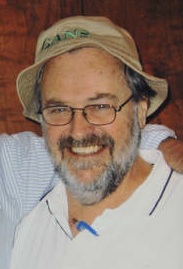

01/17/2012

In Chicago, the illegal alien accused of killing Denny McCann (pictured) disappeared after being released by authorities. (See my earlier report Cook County Releases Hit-and-Run Killer Illegal Alien after Arrest.)
Wait, wasn’t Obama supposed to be prioritizing immigration policy to deal more seriously with violent foreigners? Apparently his home-town Chicago buddies didn’t get the memo, because the Democrat-run Cook County Board of Supervisors passed a new policy by which dangerous foreign criminals are released on bail rather than held until trial or turned over to ICE for deportation.
Dangerous criminals are not supposed to be released when they are flight risks — which is the description of illegal aliens who can easily evade justice by escaping to Mexico or elsewhere. It’s stunning that public officials have so little regard for public safety, but hispandering to illegal aliens trumps that basic governmental function in Chicago today.
Bail jumper fuels Chicago illegals debate, Washington Times, January 15, 2012
CHICAGO — Controversy over a Cook County, Ill., ordinance that forbids the sheriff from notifying federal officials when they’re about to release suspected illegal immigrants from jail is heating up after a suspect charged in a fatal hit-and-run posted bail and disappeared.
Amid reports that Saul Chavez, an illegal immigrant, hasn’t been seen since late last year when his family posted bail, the nation’s top immigration official and the board president of the county that includes Chicago have squared off with dueling statements about the ordinance passed last September.
“This ordinance undermines public safety in Cook County and hinders [the Immigration and Customs Enforcement’s] ability to enforce the nation’s immigration laws,” wrote the agency’s director, John Morton, in a letter to County Board President Toni Preckwinkle. “In addition to undermining local public safety, the ordinance may also violate federal law.”
Miss Preckwinkle, though, responded in a news release that it isn’t fair to link Mr. Chavez’s immigration status with his disappearance, calling it a “red herring.”
Miss Preckwinkle said she is bothered by the case, not because of Chavez’s immigration status, but because his bail was set too low for someone with a prior felony conviction and who posed a flight risk.
“Some have tried to blame Chavez’s immigration status, but what allowed Chavez to escape prosecution was an attainable bond that didn’t take into account his criminal history and flight risk,” she said in the news release.
Cook County has been at the center of the debate over the treatment of illegal immigrants for several months. While other places, such as San Francisco, have passed similar measures in response to the Obama administration’s program that aims to pursue more criminal deportations, Cook County was the first to forbid a sheriff from holding suspected felons as well as those accused of misdemeanors.
Proponents say the county’s previous practice of holding immigrants in jail after they served their time or posted bail until federal agents could pick them up was unfair and unconstitutional.
“By refusing the detain people who are entitled to their freedom, based merely on a request from [immigration agents], we are upholding our system of justice,” Jesus Garcia, a commissioner who supported the measure, said in a statement at the time.
But critics have said the ordinance is a disaster waiting to happen, that ultimately an illegal immigrant who otherwise could have been held by federal authorities is going to walk out of jail and commit another crime.
“This is our Willie Horton moment in Cook County,” warned Commissioner Timothy Schneider at the time he voted against the ordinance, referring to the convicted killer who raped a woman and knifed her fiance in 1987 in Oxon Hill, Md., after being released as part of a Massachusetts weekend-furlough program. Horton’s case drew national attention when it was raised during the 1988 presidential campaign.
In her news release last week, Miss Preckwinkle said the problem has nothing to do with immigration and everything to do with an overwhelmed criminal justice system. Judges, she said, have to make decisions “in an instant, without access to the appropriate level of information upon which to base their decision.”
As a result, Miss Preckwinkle has called for the Cook County Judicial Advisory Council to conduct a six-month study on how bail is set in the county. According to a statement by Miss Preckwinkle, one of the goals is to provide judges with more complete information about defendants before they decide on bail.